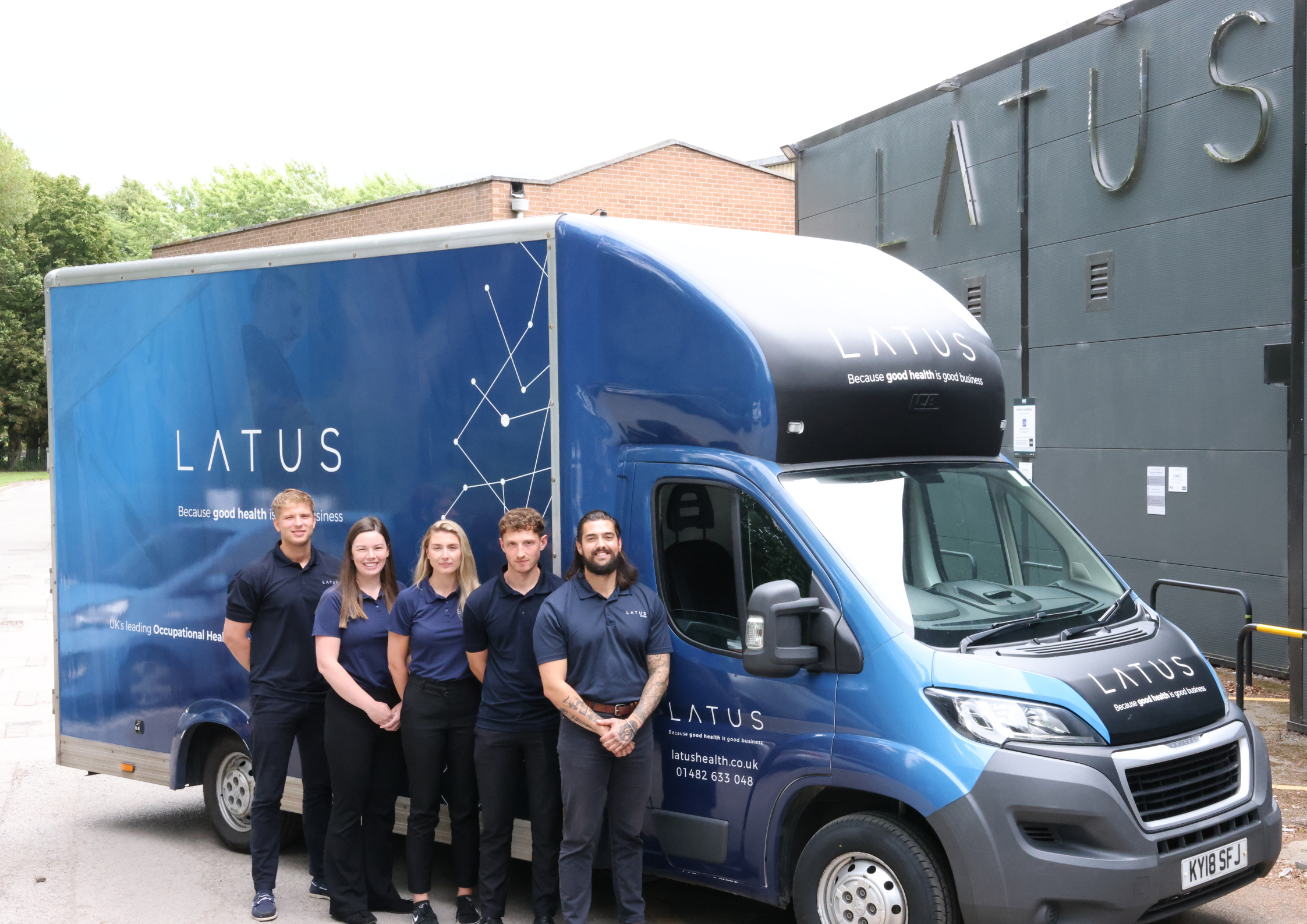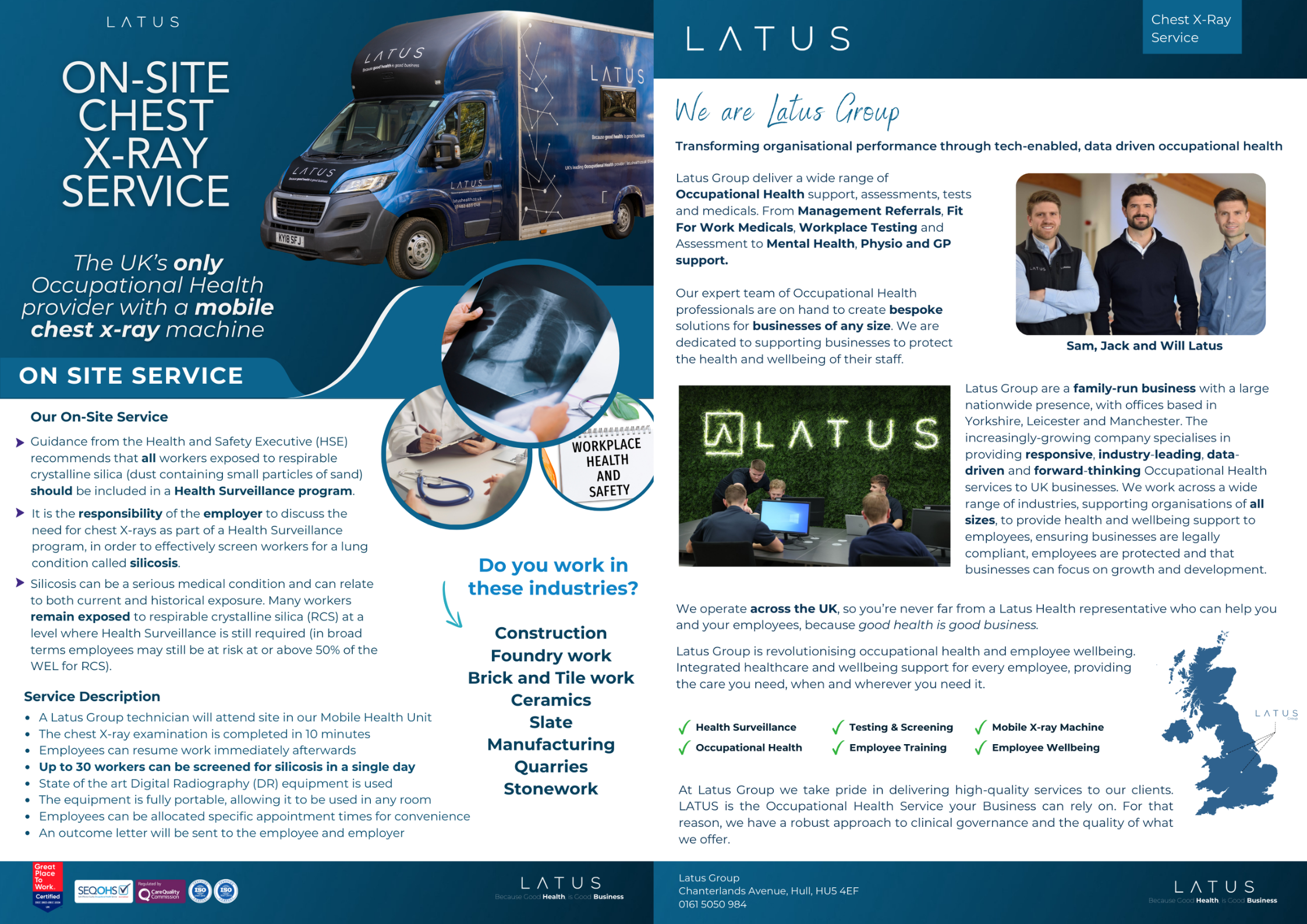Experts warn of rising numbers of silicosis amongst UK workers
Have you screened your workers?
Book your Mobile Chest X-ray appointment now!
Experts have warned of rising numbers of Silica Dust Exposure in the UK
Silica dust and Silica Dust Exposure is a serious health hazard that can lead to a range of respiratory diseases, including silicosis. This condition is caused by the inhalation of tiny silica particles, which can become trapped in the lungs and cause inflammation and scarring. For workers in industries like construction, mining, and quarrying, exposure to silica dust is a significant risk.
The Dangers of Silica Dust
According to the Health and Safety Executive (HSE), silicosis is a serious and irreversible lung disease. It can cause a range of symptoms, including:
- Shortness of breath
- Coughing
- Chest pain
- Fatigue
- Weight loss
In severe cases, silicosis can lead to respiratory failure and death.
The Importance of Chest X-rays
Regular chest X-rays are a crucial tool for detecting silicosis in workers exposed to silica dust. These scans can help to identify early signs of the disease, such as lung scarring and calcifications. Early detection is essential for preventing the progression of silicosis and managing its symptoms.
The HSE recommends that workers in industries where silica dust exposure is a risk should undergo regular chest X-rays. The frequency of these scans will depend on the level of exposure and the individual’s risk factors.
Protecting Workers from Silica Dust
To reduce the risk of silicosis, employers must implement effective control measures to minimize exposure to silica dust. These measures may include:
- Engineering controls: Using wet cutting or drilling techniques, local exhaust ventilation systems, and enclosed machinery to reduce dust levels.
- Administrative controls: Implementing safe work procedures, providing adequate training, and monitoring exposure levels.
- Personal protective equipment (PPE): Ensuring workers wear appropriate respiratory protection, such as dust masks or respirators.
By taking these steps, employers can help to protect their workers from the harmful effects of silica dust and reduce the incidence of silicosis.
As revealed in one of our latest Latus Link newsletters, Recent studies have revealed a concerning trend in the development of rising numbers of silicosis in the UK, amongst British workers working with artificial marble and granite.
Worryingly, medics have now reported the UK’s first death and a further 11 cases of artificial stone silicosis, with patients’ average age being just 34 years old. Some workers had worked cutting artificial stone for just four years before they were diagnosed with silicosis.
Rising numbers of silicosis in the UK
While the UK has established exposure limits for silica dust, enforcement challenges and widespread non-compliance remain significant issues. High-silica artificial stone, also known as engineered stone or quartz, is already banned in Australia.
“It is affecting young men, many of whom have only worked with this material for a few years. There is no good treatment and a diagnosis can be devastating. The UK needs to learn from the experience in other countries and to act quickly to minimise the number of deaths in the months and years to come.” Dr Feary, senior clinical research fellow at Imperial College London.
The disease appears to get worse even after men stopped breathing the dust.
Doctors have raised concerns by how the disease appears to get worse, even after workers stopped breathing the dust.
The rising numbers of silicosis in the UK have been likened to be similar to the incurable diseases asbestosis and mesothelioma that developed in thousands of labourers who worked with asbestos in the 1900s.
Workers in certain occupations are at higher risk of silica exposure, such as construction workers, stonemasons, tile layers and glass workers. Workers in these sectors should ensure their employers are providing the necessary protective equipment as well as conducting routine chest X-ray’s.
“UK cases are likely to increase, with urgent action needed to identify cases and enforce regulations.”
If your work involves cutting, drilling, or crushing silica-containing materials, it’s crucial to take steps to minimise dust exposure.
Latus Group offers a mobile chest x-ray service, screening workers on-site and giving employers and employees the reassurance they need.
Guidance from the Health and Safety Executive (HSE) recommends that all workers exposed to respirable crystalline silica (dust containing small particles of sand) should be included in a Health Surveillance program.
It is the responsibility of the employer to involve a health professional and to discuss the need for chest X-rays as part of a Health Surveillance program in order to effectively screen workers for a lung condition called silicosis.
Do my workers need it?
The Health and Safety Executive (HSE) have enforced limitations for what an individual’s personal exposure to RCS can be within a working day.
The HSE states, “Health Surveillance should be considered for workers who are involved in high-risk occupations, including construction, foundry work, brick and tile work, ceramics, slate, maufacturing, quarries and stonework. Where workers are regularly exposed to RCS dust and there is a reasonable likelihood that silicosis may develop, Health Surveillance must be provided”
The current Workplace Exposure Limit (WEL) is 0.1mg per cubic metre over a Time Weighted Allowance (TWA) of 8 hours, and a Maximum Exposure Limit (MEL) of 0.3mg per cubic metre.
The Control of Substances Hazardous to Health (COSHH) Regulations provides guidance for employers on how to assess and control exposure to hazardous substances, including silica dust.
Latus Group’s Mobile Chest X-ray: a convenient and effective screening tool
Latus Group provide a mobile, on-site chest X-ray service that fully aligns employers with this recent updated guidance from the HSE, enabling them to demonstrate good working practice.
By implementing regular mobile chest X-ray screenings, companies can proactively protect their workforce from the devastating effects of crystalline silica dust. Early detection allows for treatment interventions and ensures workers are aware of the risks associated with their jobs.
Latus Group’s mobile solution empowers businesses to prioritise worker health and safety, creating a healthier work environment for all.
What to expect from your chest x-ray with Latus Group
Latus will attend site on a day convenient to the site and deliver a chest X-ray service against shift patterns of employees.
The entire chest X-ray examination is completed within 10 minutes and employees are able to return to their normal activities immediately.
Up to 30 workers can be screened for silicosis in a single day.
State of the art Digital Radiography (DR) equipment is used; this gives a very high resolution image which is a very effective screen for silicosis or other occupational lung disease.
Furthermore, the equipment used delivers very low doses of radiation and the risk is therefore extremely low.
The equipment is fully portable, allowing the chest X-rays to be taken in a suitable room on-site. We will ensure the room is suitable through a risk assessment process.
Employees can be allocated specific appointment times for their chest X-ray against a schedule that we will provide.
Once the chest X-rays have been taken, read and reported on, an outcome letter will be sent to the employee and employer. The letter will advise on the results of the chest X-ray and the appropriate action regarding continued participation in statutory Health Surveillance, including the chest X-ray program.
To submit an enquiry to book our mobile chest x-ray service, click here



